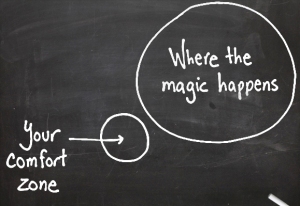If you have the opportunity to do something you want to, but it scares you, do it – especially if it scares you.
This is the kind of advice you frequently find on the internet (and increasingly from annoying Facebook posts/links…). In general I think it’s probably right.
Get out of the house, do something different, try a new sport/activity/food whatever. It’ll be good for you.
But how does it feel actually doing it?
Fucking terrifying.
As you may know if you’ve been here before, a few months back I officially finished (resigned) working at Mega Corp., and decided to live off of the “fat” I’d managed to accumulate in my time there, and began trying to ‘get a foot in the door’ as some kind of freelance science writer. I knew this was never going to be easy – there’s too many good writers already out there for a start.
I didn’t get right into finding stories, writing and pitching after I finished work, largely as there was another fairly life changing event around the same time.
I’ll not go into details too much here, but let’s just say it involves – like all good stories – having met a girl I find amazing (and who seems similarly keen on me: presumably indicative of some kind of hidden mental instability*). One problem though: she’s just moved back home to Canada to start her PhD.
Fucksocks.
So, I spent nearly a month over there with her, and will be going back again soon for a month or two. In and of itself, this shouldn’t be detrimental to getting some writing done and some articles pitched.
I have managed to get a lead on a few interesting stories, and have made one pitch, which was very graciously knocked back, with a “we liked the idea, though it’s not really for us, but do please keep them coming.”
Don’t worry. I will. And better.
I also got my website/blog built, finalised and live for the actual science writing, once written, which you can find here. Sciencehubb.co.uk – geddit? Not too much there right now, a couple of bits from my uni MSc and one newer one from the other day.
What else have I been up to?
Well, helping to try and organise some kind of science writing course with a group of folks from Oxford Uni and – anxiously – looking at how I can get over to Canada more permanently, which has taken up a fair bit of my time. Time I will gladly spend trying to make it work. But it does eat into some of that “fat” I had ready to keep me fed, housed and clothed, shortening how long it will be there. It’s worth it though.
The good news is that under the current immigration system I score enough points (just) to be admitted. The bad news is they stopped receiving applications in July, pending a revised system. Something tells me this will probably work against me. Fucksocks again.
This shift in priorities worries me. Moving to Canada is a priority, and I wouldn’t have it any other way; but it does conflict with my previous plans if I can’t get ‘permanent residence’ status.
The fact I don’t have a regular desk/lab bench job anymore is awesome as it gives me the flexibility to be able to shoot off Canada for a few months at a time (where I can at least still find stories and write), but, at the same time, I’m not bringing in any money myself yet. And I don’t know when, or how much I will be able to.
This puts an increasing pressure on me to somehow make money from this enterprise of being a science writer. This was never going to be easy, nor offer short-term to financial stability. I am finding this kinda stressful at the moment; when no one even knows my name right now, and with little written material ‘out there’.
So, immediate plans are thus:
- Keep an eye out for new/proposed Canadian immigration rules (game changer)
- Write, write, and write
- Read, read and read
- Find as many places to pitch to as possible
- Pitch!
- Get clippings wherever and whenever I can to show to editors
And that is what’s going on right now. If you have any advice, please let me have it, otherwise, just cross your fingers for me…
*Sorry if you’re reading this. I have the utmost confidence you are sane. 😀



